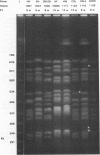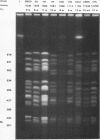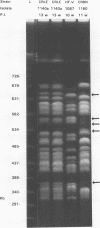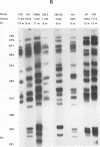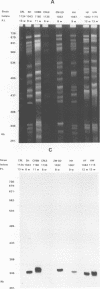Abstract
There is increasing molecular and antigenic evidence that Pneumocystis carinii organisms isolated from humans, ferrets, and rats are different species. In contrast, little is known about the extent of genetic diversity among P. carinii strains found within a single mammalian species. In the present study, electrophoretic karyotypes were obtained from P. carinii prepared from 10 chronically immunosuppressed rat colonies to investigate diversity at the chromosomal level. Most organism preparations produced patterns with 13 to 15 bands, but as many as 24 bands were observed in a few preparations. All bands separated between 700 and 300 kbp. Four distinct karyotype forms emerged from among the 13- to 15-band karyotypes of the 10 colonies sampled. Form 1 was shared by five rat strains from two vendors; form 2 was shared by two rat strains from the same vendor; and forms 3 and 4 were unique to their vendor colonies. Within a given rat colony, most rats harbored the same P. carinii karyotype. A survey of selected rat colonies showed that the karyotype within a vendor colony could remain stable over a period of 2 to 3 years. Hybridization of the blotted karyotypes with a repetitive DNA element isolated from rat-derived P. carinii and with single-copy gene probes showed that every chromosome in the karyotypes contained some repetitive DNA, and there was a general size concordance among the chromosomes carrying the unique gene loci. Differences in gene sequences, electrophoretic karyotypes, and hybridization profiles suggested that the immunosuppressed rats were infected by genetically distinct P. carinii strains. A provisional system of nomenclature for P. carinii that will permit differentiation of P. carinii organisms from the same mammalian host is discussed. These data show that all rats were not infected by a single type of P. carinii, that pulsed-field gradient electrophoresis can detect sufficient genetic diversity among the organism preparations to allow for characterization of the organisms, and that the genome of the organism within the rat host is relatively stable over time.
Full text
PDF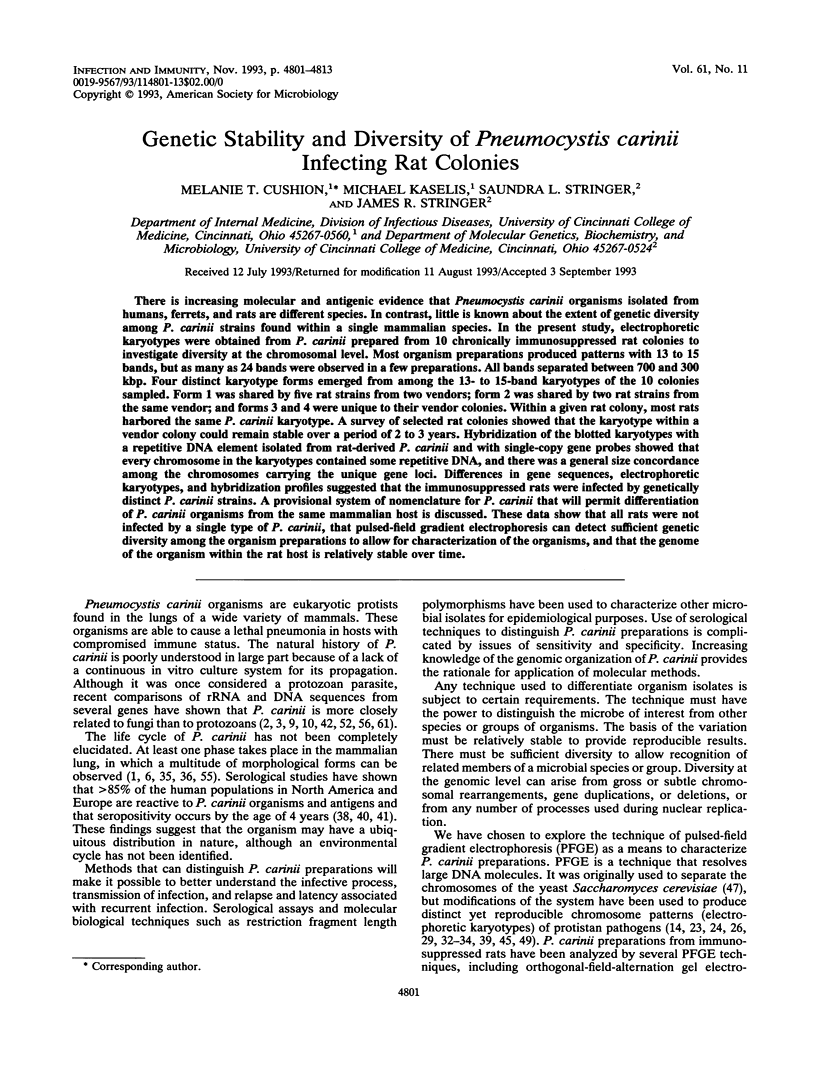
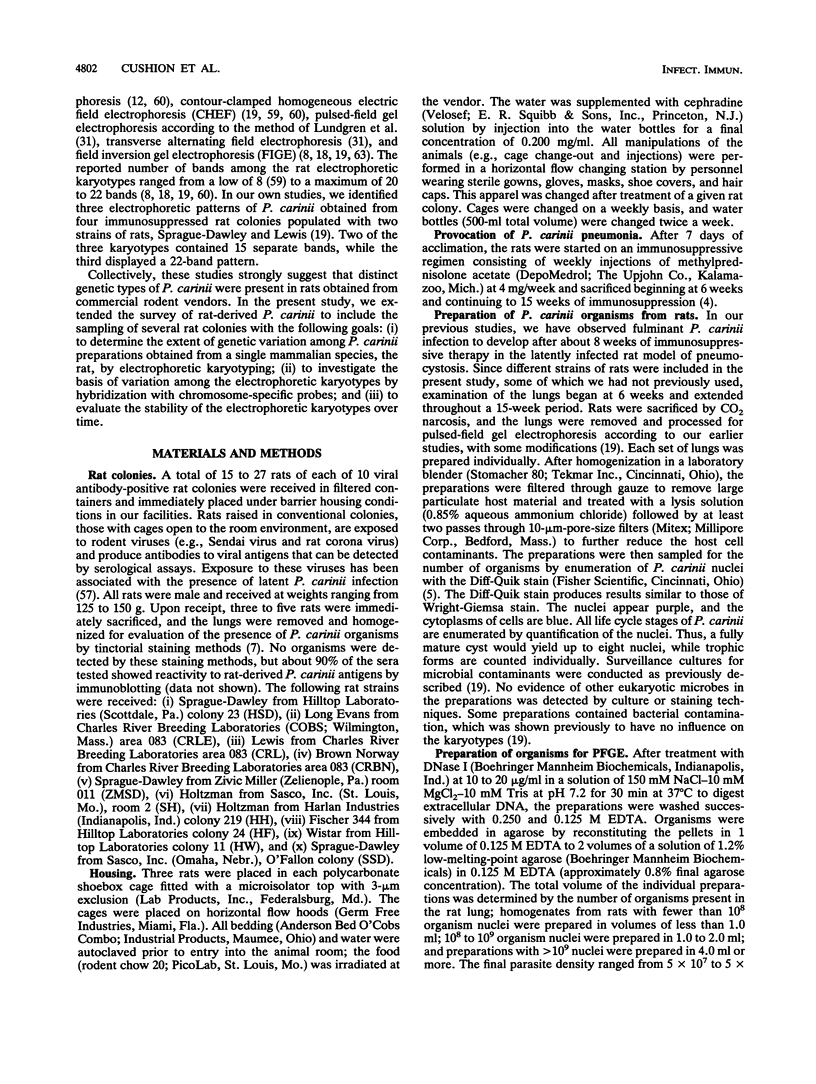
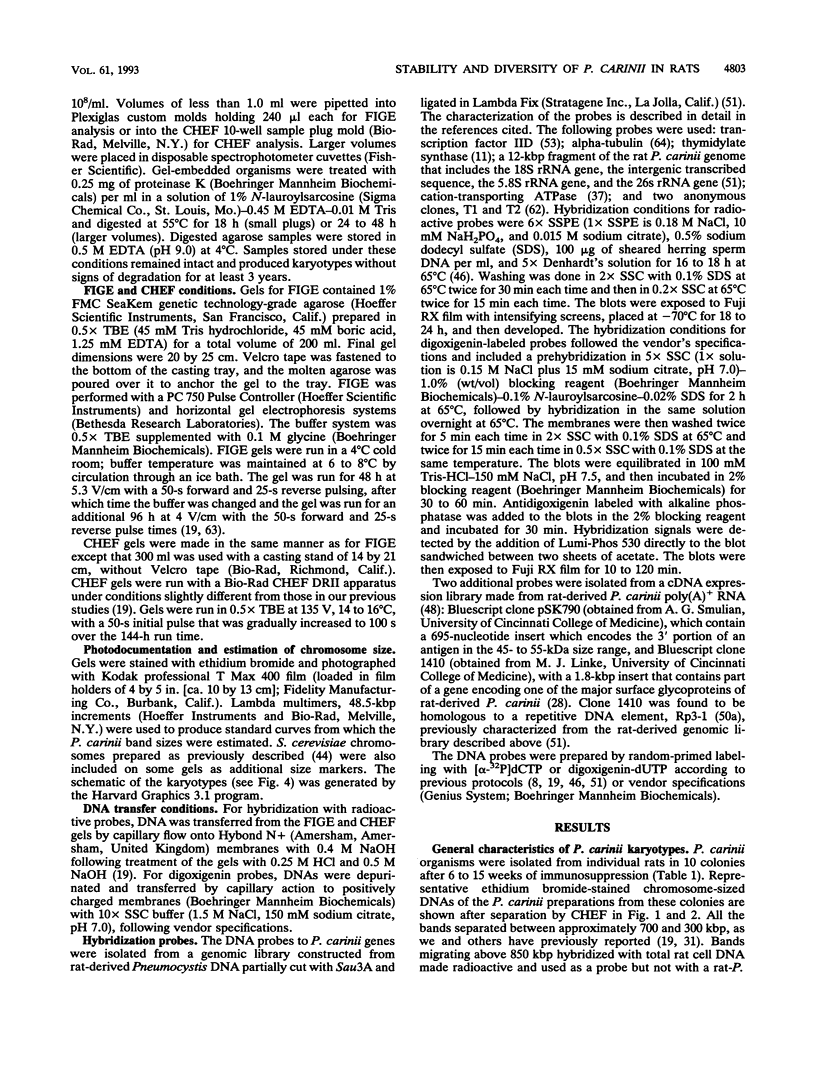
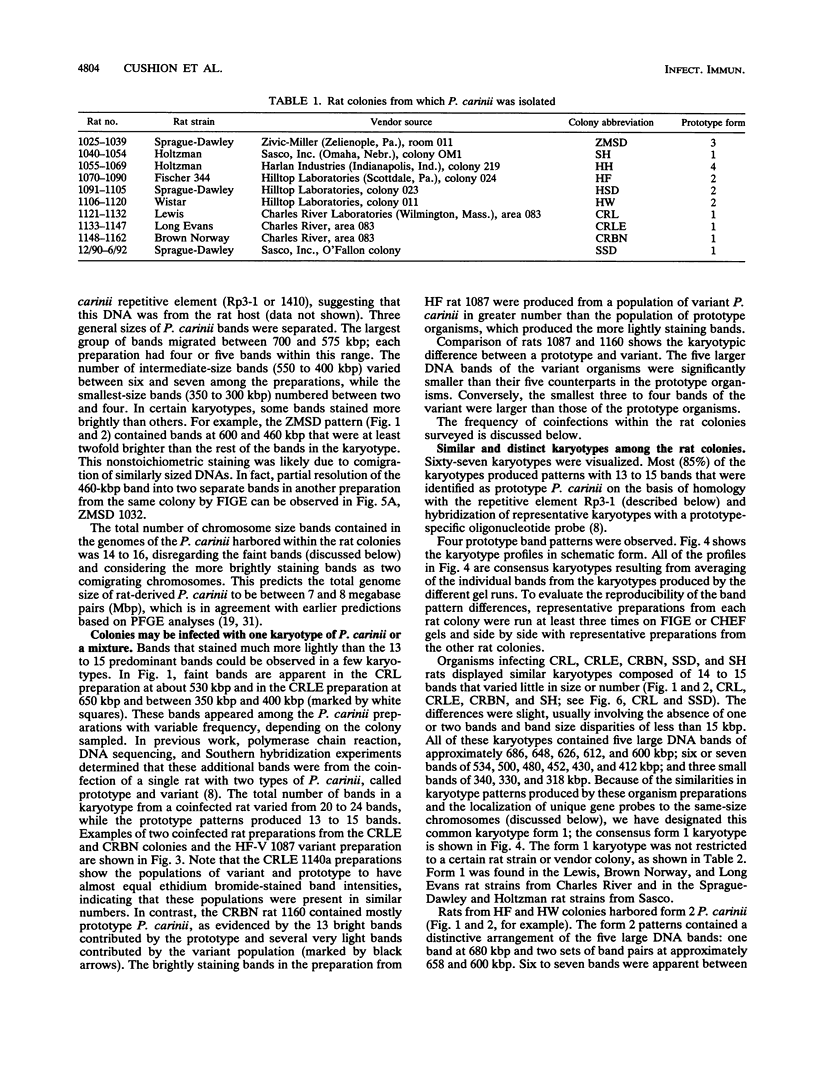
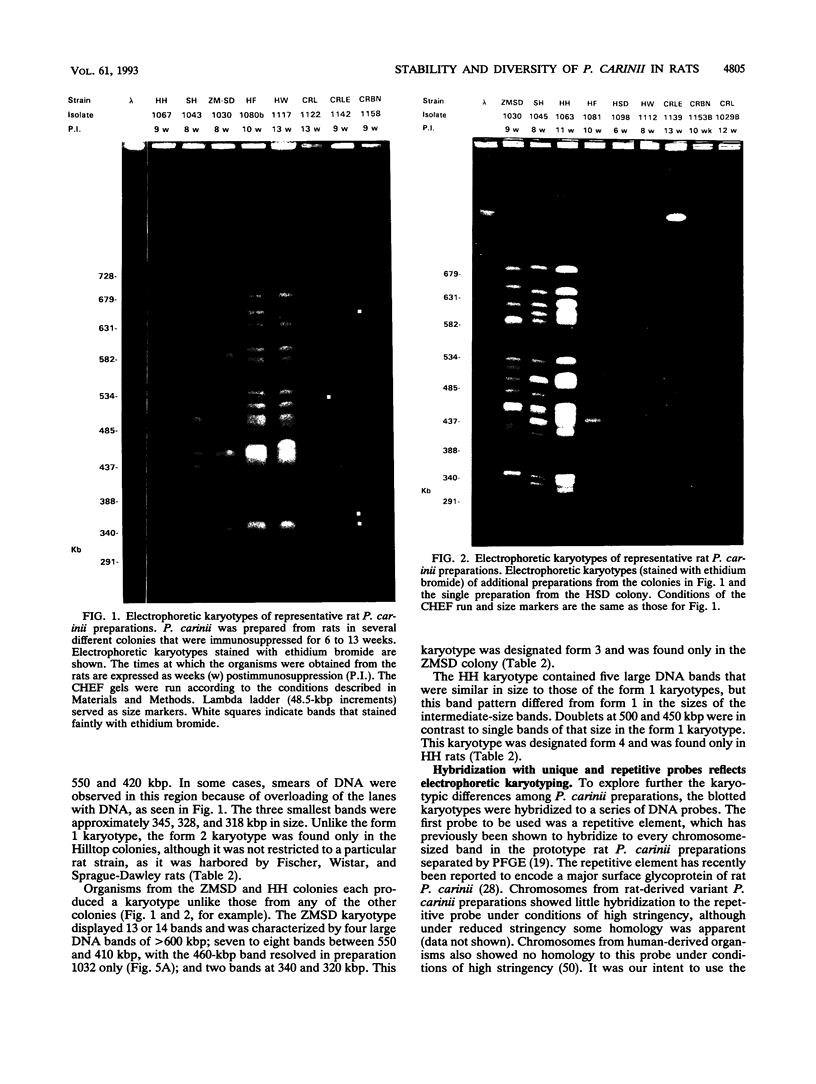
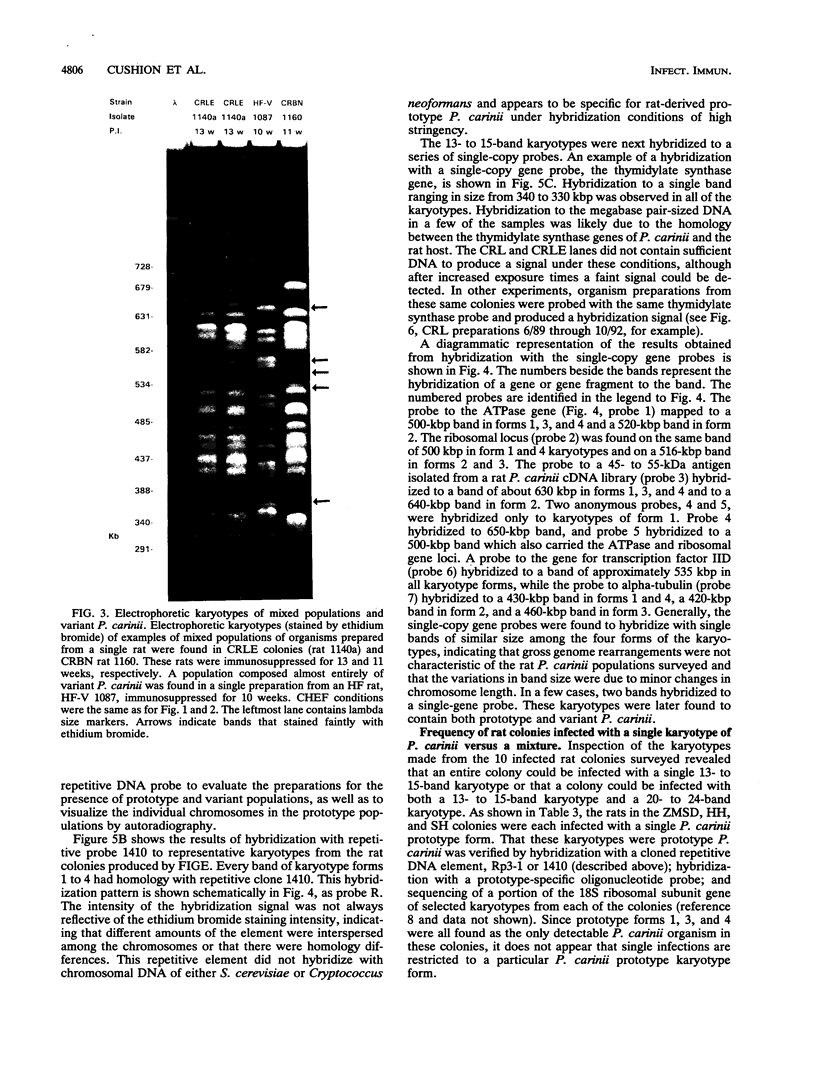
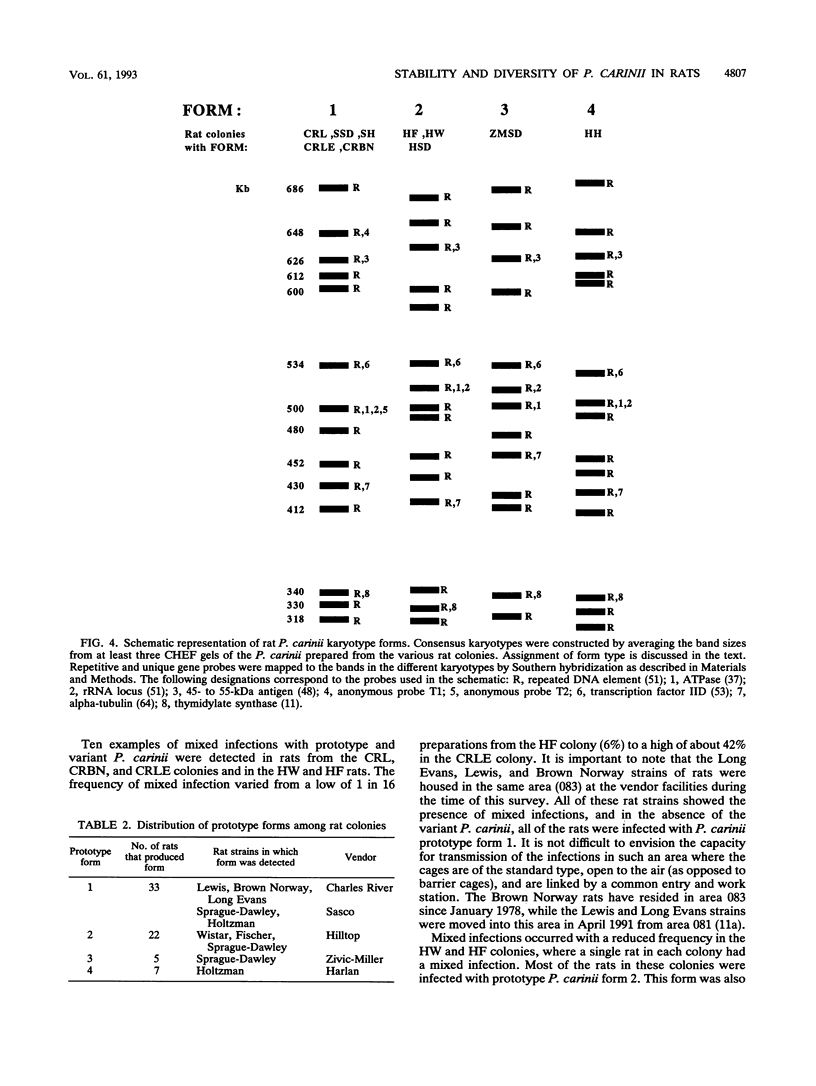
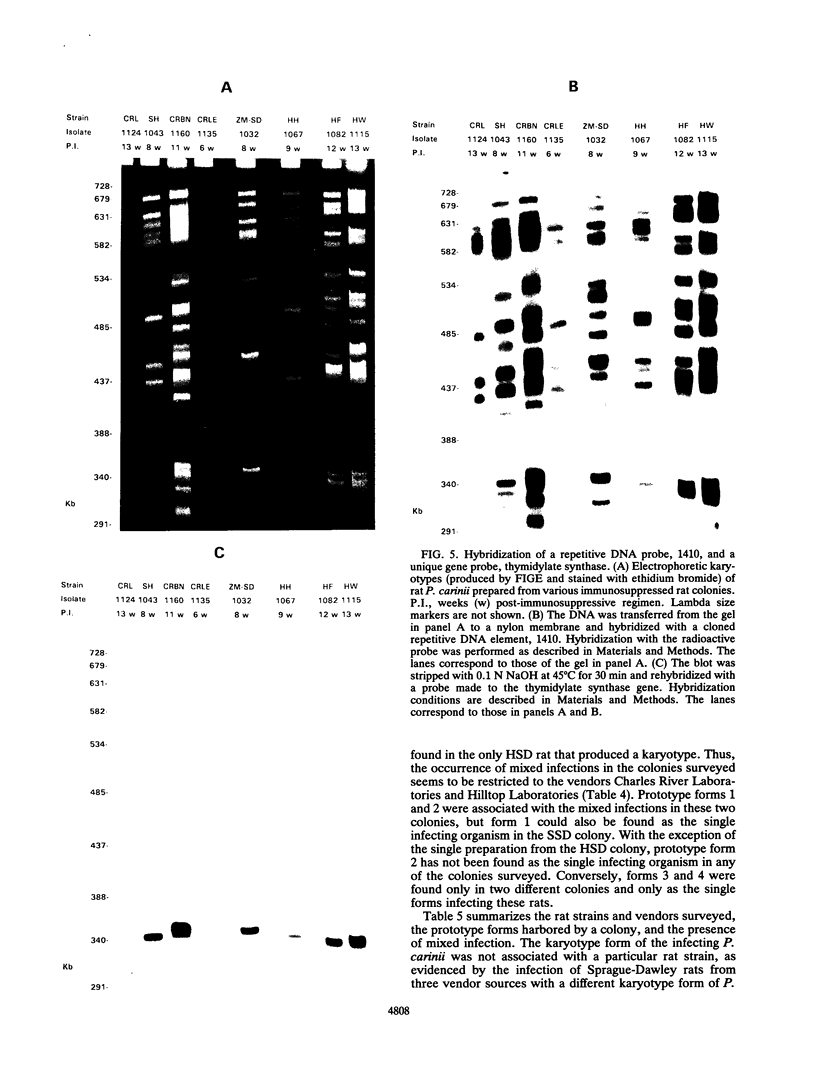
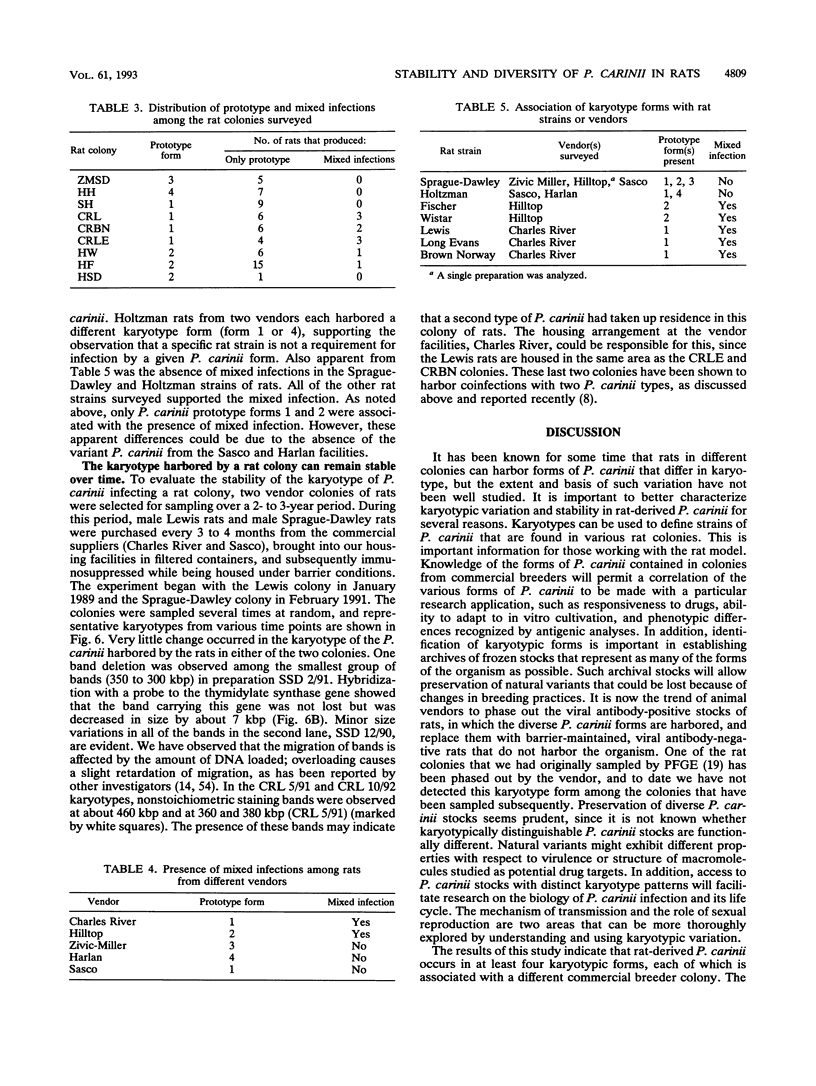
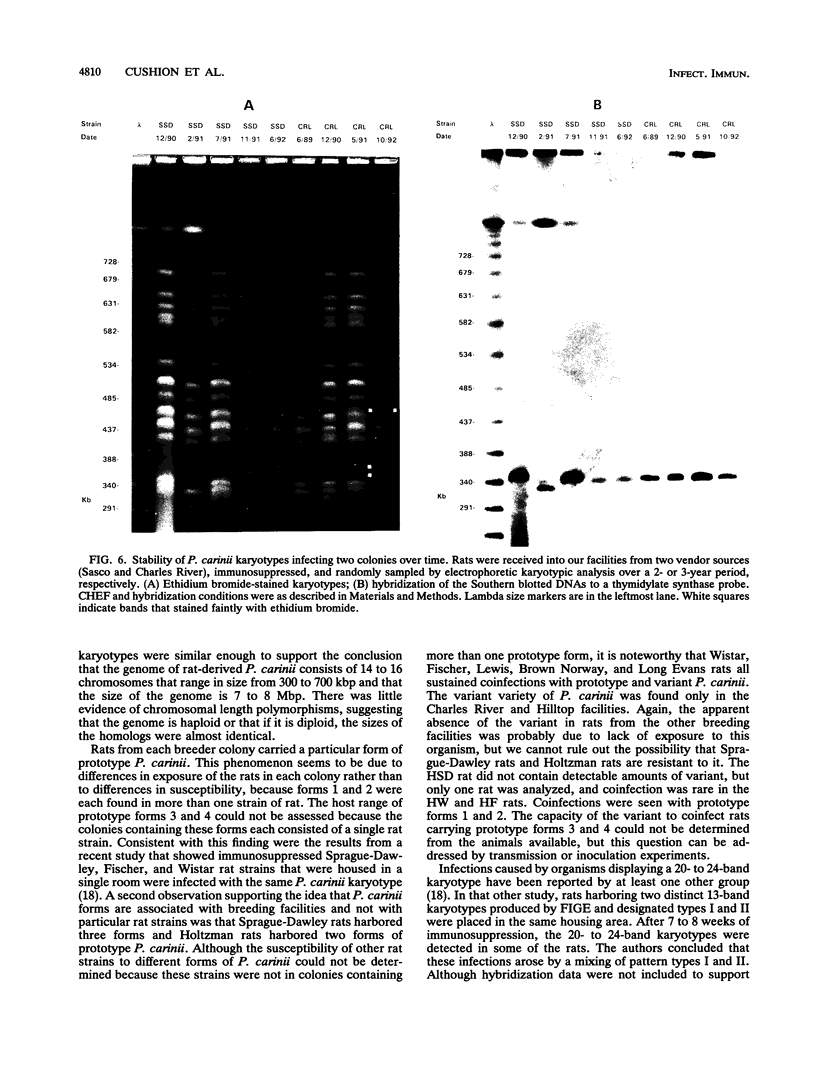
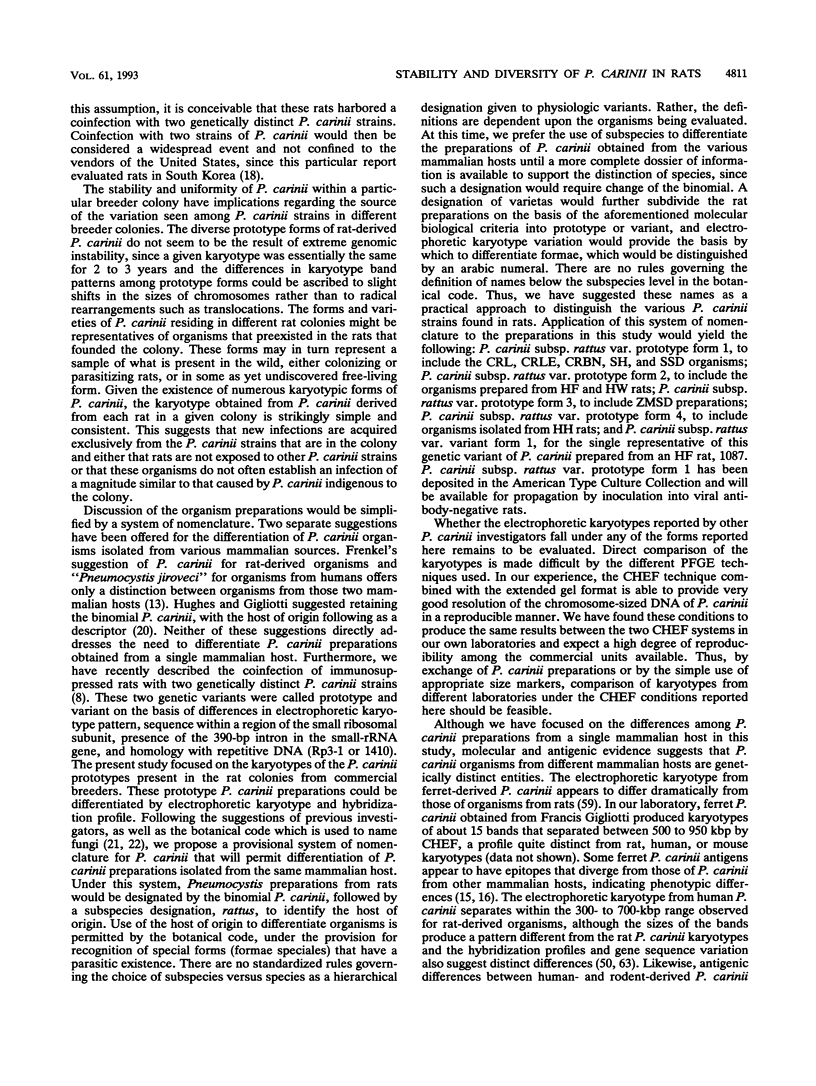
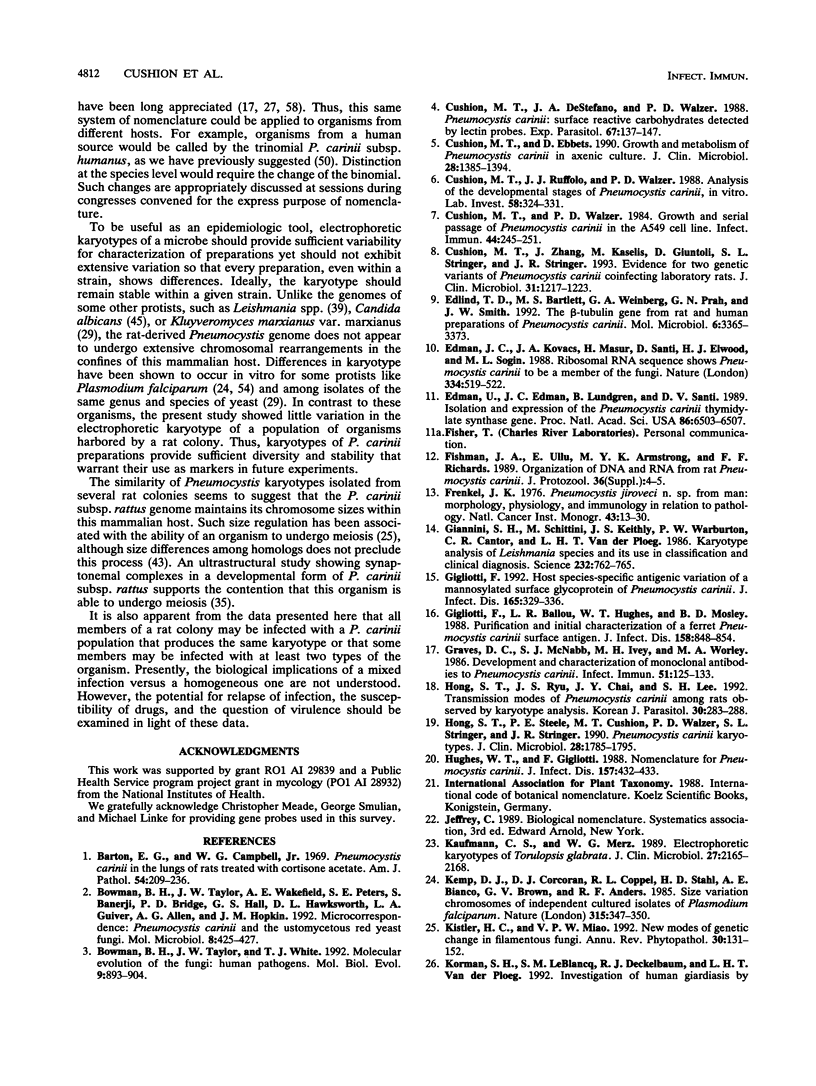
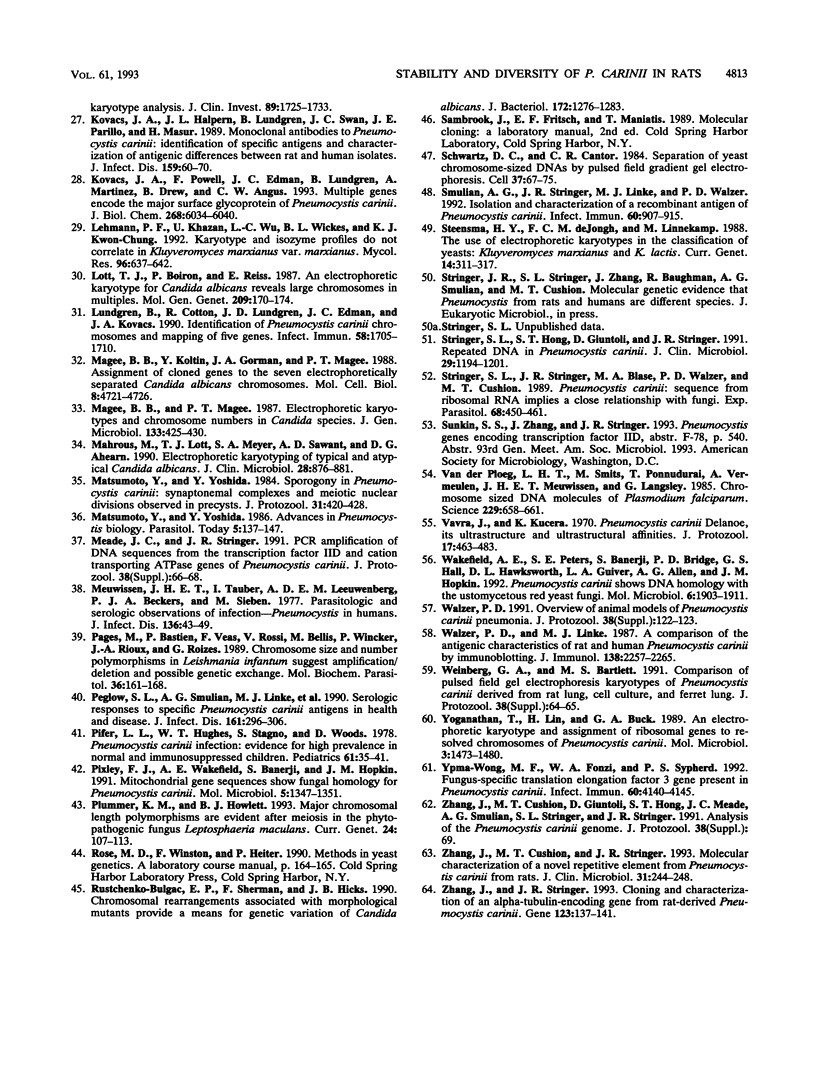
Images in this article
Selected References
These references are in PubMed. This may not be the complete list of references from this article.
- Barton E. G., Jr, Campbell W. G., Jr Pneumocystis carinii in lungs of rats treated with cortisone acetate. Ultrastructural observations relating to the life cycle. Am J Pathol. 1969 Feb;54(2):209–236. [PMC free article] [PubMed] [Google Scholar]
- Bowman B. H., Taylor J. W., White T. J. Molecular evolution of the fungi: human pathogens. Mol Biol Evol. 1992 Sep;9(5):893–904. doi: 10.1093/oxfordjournals.molbev.a040766. [DOI] [PubMed] [Google Scholar]
- Cushion M. T., DeStefano J. A., Walzer P. D. Pneumocystis carinii: surface reactive carbohydrates detected by lectin probes. Exp Parasitol. 1988 Dec;67(2):137–147. doi: 10.1016/0014-4894(88)90061-6. [DOI] [PubMed] [Google Scholar]
- Cushion M. T., Ebbets D. Growth and metabolism of Pneumocystis carinii in axenic culture. J Clin Microbiol. 1990 Jun;28(6):1385–1394. doi: 10.1128/jcm.28.6.1385-1394.1990. [DOI] [PMC free article] [PubMed] [Google Scholar]
- Cushion M. T., Ruffolo J. J., Walzer P. D. Analysis of the developmental stages of Pneumocystis carinii, in vitro. Lab Invest. 1988 Mar;58(3):324–331. [PubMed] [Google Scholar]
- Cushion M. T., Walzer P. D. Growth and serial passage of Pneumocystis carinii in the A549 cell line. Infect Immun. 1984 May;44(2):245–251. doi: 10.1128/iai.44.2.245-251.1984. [DOI] [PMC free article] [PubMed] [Google Scholar]
- Cushion M. T., Zhang J., Kaselis M., Giuntoli D., Stringer S. L., Stringer J. R. Evidence for two genetic variants of Pneumocystis carinii coinfecting laboratory rats. J Clin Microbiol. 1993 May;31(5):1217–1223. doi: 10.1128/jcm.31.5.1217-1223.1993. [DOI] [PMC free article] [PubMed] [Google Scholar]
- Edlind T. D., Bartlett M. S., Weinberg G. A., Prah G. N., Smith J. W. The beta-tubulin gene from rat and human isolates of Pneumocystis carinii. Mol Microbiol. 1992 Nov;6(22):3365–3373. doi: 10.1111/j.1365-2958.1992.tb02204.x. [DOI] [PubMed] [Google Scholar]
- Edman J. C., Kovacs J. A., Masur H., Santi D. V., Elwood H. J., Sogin M. L. Ribosomal RNA sequence shows Pneumocystis carinii to be a member of the fungi. Nature. 1988 Aug 11;334(6182):519–522. doi: 10.1038/334519a0. [DOI] [PubMed] [Google Scholar]
- Edman U., Edman J. C., Lundgren B., Santi D. V. Isolation and expression of the Pneumocystis carinii thymidylate synthase gene. Proc Natl Acad Sci U S A. 1989 Sep;86(17):6503–6507. doi: 10.1073/pnas.86.17.6503. [DOI] [PMC free article] [PubMed] [Google Scholar]
- Frenkel J. K. Pneumocystis jiroveci n. sp. from man: morphology, physiology, and immunology in relation to pathology. Natl Cancer Inst Monogr. 1976 Oct;43:13–30. [PubMed] [Google Scholar]
- Giannini S. H., Schittini M., Keithly J. S., Warburton P. W., Cantor C. R., Van der Ploeg L. H. Karyotype analysis of Leishmania species and its use in classification and clinical diagnosis. Science. 1986 May 9;232(4751):762–765. doi: 10.1126/science.3961502. [DOI] [PubMed] [Google Scholar]
- Gigliotti F., Ballou L. R., Hughes W. T., Mosley B. D. Purification and initial characterization of a ferret Pneumocystis carinii surface antigen. J Infect Dis. 1988 Oct;158(4):848–854. doi: 10.1093/infdis/158.4.848. [DOI] [PubMed] [Google Scholar]
- Gigliotti F. Host species-specific antigenic variation of a mannosylated surface glycoprotein of Pneumocystis carinii. J Infect Dis. 1992 Feb;165(2):329–336. doi: 10.1093/infdis/165.2.329. [DOI] [PubMed] [Google Scholar]
- Graves D. C., McNabb S. J., Ivey M. H., Worley M. A. Development and characterization of monoclonal antibodies to Pneumocystis carinii. Infect Immun. 1986 Jan;51(1):125–133. doi: 10.1128/iai.51.1.125-133.1986. [DOI] [PMC free article] [PubMed] [Google Scholar]
- Hong S. T., Ryu J. S., Chai J. Y., Lee S. H. Transmission modes of Pneumocystis carinii among rats observed by karyotype analysis. Kisaengchunghak Chapchi. 1992 Dec;30(4):283–288. doi: 10.3347/kjp.1992.30.4.283. [DOI] [PubMed] [Google Scholar]
- Hong S. T., Steele P. E., Cushion M. T., Walzer P. D., Stringer S. L., Stringer J. R. Pneumocystis carinii karyotypes. J Clin Microbiol. 1990 Aug;28(8):1785–1795. doi: 10.1128/jcm.28.8.1785-1795.1990. [DOI] [PMC free article] [PubMed] [Google Scholar]
- Hughes W. T., Gigliotti F. Nomenclature for Pneumocystis carinii. J Infect Dis. 1988 Mar;157(3):432–433. doi: 10.1093/infdis/157.3.432. [DOI] [PubMed] [Google Scholar]
- Kaufmann C. S., Merz W. G. Electrophoretic karyotypes of Torulopsis glabrata. J Clin Microbiol. 1989 Oct;27(10):2165–2168. doi: 10.1128/jcm.27.10.2165-2168.1989. [DOI] [PMC free article] [PubMed] [Google Scholar]
- Kemp D. J., Corcoran L. M., Coppel R. L., Stahl H. D., Bianco A. E., Brown G. V., Anders R. F. Size variation in chromosomes from independent cultured isolates of Plasmodium falciparum. Nature. 1985 May 23;315(6017):347–350. doi: 10.1038/315347a0. [DOI] [PubMed] [Google Scholar]
- Korman S. H., Le Blancq S. M., Deckelbaum R. J., Van der Ploeg L. H. Investigation of human giardiasis by karyotype analysis. J Clin Invest. 1992 Jun;89(6):1725–1733. doi: 10.1172/JCI115774. [DOI] [PMC free article] [PubMed] [Google Scholar]
- Kovacs J. A., Halpern J. L., Lundgren B., Swan J. C., Parrillo J. E., Masur H. Monoclonal antibodies to Pneumocystis carinii: identification of specific antigens and characterization of antigenic differences between rat and human isolates. J Infect Dis. 1989 Jan;159(1):60–70. doi: 10.1093/infdis/159.1.60. [DOI] [PubMed] [Google Scholar]
- Kovacs J. A., Powell F., Edman J. C., Lundgren B., Martinez A., Drew B., Angus C. W. Multiple genes encode the major surface glycoprotein of Pneumocystis carinii. J Biol Chem. 1993 Mar 15;268(8):6034–6040. [PubMed] [Google Scholar]
- Lott T. J., Boiron P., Reiss E. An electrophoretic karyotype for Candida albicans reveals large chromosomes in multiples. Mol Gen Genet. 1987 Aug;209(1):170–174. doi: 10.1007/BF00329854. [DOI] [PubMed] [Google Scholar]
- Lundgren B., Cotton R., Lundgren J. D., Edman J. C., Kovacs J. A. Identification of Pneumocystis carinii chromosomes and mapping of five genes. Infect Immun. 1990 Jun;58(6):1705–1710. doi: 10.1128/iai.58.6.1705-1710.1990. [DOI] [PMC free article] [PubMed] [Google Scholar]
- Magee B. B., Koltin Y., Gorman J. A., Magee P. T. Assignment of cloned genes to the seven electrophoretically separated Candida albicans chromosomes. Mol Cell Biol. 1988 Nov;8(11):4721–4726. doi: 10.1128/mcb.8.11.4721. [DOI] [PMC free article] [PubMed] [Google Scholar]
- Magee B. B., Magee P. T. Electrophoretic karyotypes and chromosome numbers in Candida species. J Gen Microbiol. 1987 Feb;133(2):425–430. doi: 10.1099/00221287-133-2-425. [DOI] [PubMed] [Google Scholar]
- Mahrous M., Lott T. J., Meyer S. A., Sawant A. D., Ahearn D. G. Electrophoretic karyotyping of typical and atypical Candida albicans. J Clin Microbiol. 1990 May;28(5):876–881. doi: 10.1128/jcm.28.5.876-881.1990. [DOI] [PMC free article] [PubMed] [Google Scholar]
- Matsumoto Y., Yoshida Y. Advances in pneumocystis biology. Parasitol Today. 1986 May;2(5):137–142. doi: 10.1016/0169-4758(86)90178-x. [DOI] [PubMed] [Google Scholar]
- Matsumoto Y., Yoshida Y. Sporogony in Pneumocystis carinii: synaptonemal complexes and meiotic nuclear divisions observed in precysts. J Protozool. 1984 Aug;31(3):420–428. doi: 10.1111/j.1550-7408.1984.tb02989.x. [DOI] [PubMed] [Google Scholar]
- Meuwissen J. H., Tauber I., Leeuwenberg A. D., Beckers P. J., Sieben M. Parasitologic and serologic observations of infection with Pneumocystis in humans. J Infect Dis. 1977 Jul;136(1):43–49. doi: 10.1093/infdis/136.1.43. [DOI] [PubMed] [Google Scholar]
- Pagès M., Bastien P., Veas F., Rossi V., Bellis M., Wincker P., Rioux J. A., Roizès G. Chromosome size and number polymorphisms in Leishmania infantum suggest amplification/deletion and possible genetic exchange. Mol Biochem Parasitol. 1989 Sep;36(2):161–168. doi: 10.1016/0166-6851(89)90188-6. [DOI] [PubMed] [Google Scholar]
- Peglow S. L., Smulian A. G., Linke M. J., Pogue C. L., Nurre S., Crisler J., Phair J., Gold J. W., Armstrong D., Walzer P. D. Serologic responses to Pneumocystis carinii antigens in health and disease. J Infect Dis. 1990 Feb;161(2):296–306. doi: 10.1093/infdis/161.2.296. [DOI] [PubMed] [Google Scholar]
- Pifer L. L., Hughes W. T., Stagno S., Woods D. Pneumocystis carinii infection: evidence for high prevalence in normal and immunosuppressed children. Pediatrics. 1978 Jan;61(1):35–41. [PubMed] [Google Scholar]
- Pixley F. J., Wakefield A. E., Banerji S., Hopkin J. M. Mitochondrial gene sequences show fungal homology for Pneumocystis carinii. Mol Microbiol. 1991 Jun;5(6):1347–1351. doi: 10.1111/j.1365-2958.1991.tb00781.x. [DOI] [PubMed] [Google Scholar]
- Plummer K. M., Howlett B. J. Major chromosomal length polymorphisms are evident after meiosis in the phytopathogenic fungus Leptosphaeria maculans. Curr Genet. 1993 Jul-Aug;24(1-2):107–113. doi: 10.1007/BF00324673. [DOI] [PubMed] [Google Scholar]
- Rustchenko-Bulgac E. P., Sherman F., Hicks J. B. Chromosomal rearrangements associated with morphological mutants provide a means for genetic variation of Candida albicans. J Bacteriol. 1990 Mar;172(3):1276–1283. doi: 10.1128/jb.172.3.1276-1283.1990. [DOI] [PMC free article] [PubMed] [Google Scholar]
- Schwartz D. C., Cantor C. R. Separation of yeast chromosome-sized DNAs by pulsed field gradient gel electrophoresis. Cell. 1984 May;37(1):67–75. doi: 10.1016/0092-8674(84)90301-5. [DOI] [PubMed] [Google Scholar]
- Smulian A. G., Stringer J. R., Linke M. J., Walzer P. D. Isolation and characterization of a recombinant antigen of Pneumocystis carinii. Infect Immun. 1992 Mar;60(3):907–915. doi: 10.1128/iai.60.3.907-915.1992. [DOI] [PMC free article] [PubMed] [Google Scholar]
- Stringer S. L., Hong S. T., Giuntoli D., Stringer J. R. Repeated DNA in Pneumocystis carinii. J Clin Microbiol. 1991 Jun;29(6):1194–1201. doi: 10.1128/jcm.29.6.1194-1201.1991. [DOI] [PMC free article] [PubMed] [Google Scholar]
- Stringer S. L., Stringer J. R., Blase M. A., Walzer P. D., Cushion M. T. Pneumocystis carinii: sequence from ribosomal RNA implies a close relationship with fungi. Exp Parasitol. 1989 May;68(4):450–461. doi: 10.1016/0014-4894(89)90130-6. [DOI] [PubMed] [Google Scholar]
- Taylor J. W., Bowman B. H. Pneumocystis carinii and the ustomycetous red yeast fungi. Mol Microbiol. 1993 Apr;8(2):425–427. doi: 10.1111/j.1365-2958.1993.tb01585.x. [DOI] [PubMed] [Google Scholar]
- Van der Ploeg L. H., Smits M., Ponnudurai T., Vermeulen A., Meuwissen J. H., Langsley G. Chromosome-sized DNA molecules of Plasmodium falciparum. Science. 1985 Aug 16;229(4714):658–661. doi: 10.1126/science.3895435. [DOI] [PubMed] [Google Scholar]
- Vavra J., Kucera K. Pneumocystis carinii delanoë, its ultrastructure and ultrastructural affinities. J Protozool. 1970 Aug;17(3):463–483. doi: 10.1111/j.1550-7408.1970.tb04715.x. [DOI] [PubMed] [Google Scholar]
- Wakefield A. E., Peters S. E., Banerji S., Bridge P. D., Hall G. S., Hawksworth D. L., Guiver L. A., Allen A. G., Hopkin J. M. Pneumocystis carinii shows DNA homology with the ustomycetous red yeast fungi. Mol Microbiol. 1992 Jul;6(14):1903–1911. doi: 10.1111/j.1365-2958.1992.tb01363.x. [DOI] [PubMed] [Google Scholar]
- Walzer P. D., Linke M. J. A comparison of the antigenic characteristics of rat and human Pneumocystis carinii by immunoblotting. J Immunol. 1987 Apr 1;138(7):2257–2265. [PubMed] [Google Scholar]
- Yoganathan T., Lin H., Buck G. A. An electrophoretic karyotype and assignment of ribosomal genes to resolved chromosomes of Pneumocystis carinii. Mol Microbiol. 1989 Nov;3(11):1473–1480. doi: 10.1111/j.1365-2958.1989.tb00132.x. [DOI] [PubMed] [Google Scholar]
- Ypma-Wong M. F., Fonzi W. A., Sypherd P. S. Fungus-specific translation elongation factor 3 gene present in Pneumocystis carinii. Infect Immun. 1992 Oct;60(10):4140–4145. doi: 10.1128/iai.60.10.4140-4145.1992. [DOI] [PMC free article] [PubMed] [Google Scholar]
- Zhang J., Cushion M. T., Stringer J. R. Molecular characterization of a novel repetitive element from Pneumocystis carinii from rats. J Clin Microbiol. 1993 Feb;31(2):244–248. doi: 10.1128/jcm.31.2.244-248.1993. [DOI] [PMC free article] [PubMed] [Google Scholar]
- Zhang J., Stringer J. R. Cloning and characterization of an alpha-tubulin-encoding gene from rat-derived Pneumocystis carinii. Gene. 1993 Jan 15;123(1):137–141. doi: 10.1016/0378-1119(93)90553-f. [DOI] [PubMed] [Google Scholar]



